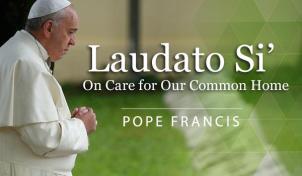
By Joan Martinez Alier.
The long awaited ecological encyclical, recently released by Pope Francis, gives a welcome boost to many issues that EJOLT has been working on. Yes, the Pope insists on the crazy Catholic idea that population growth does not matter for the environment (paragraph 50). There certainly is a positive correlation between more population and carbon emissions that would become even stronger if the new population becomes richer, as Paul Ehrlich wrote long ago in the IPAT equation. This aside, the Encyclical is factually accurate on many important environmental issues (biodiversity loss, climate change), it mentions the need for simplicity in lifestyle and even the need for some economic “degrowth“, it puts together the claims against poverty and for a better environment (citing Liberation theologian Leonardo Boff’s book title, Cry of the Earth, Cry of the Poor). It is an inspiring document addressed to all humans, not only Roman Catholics. It asserts the fundamental right to water, it defends indigenous populations against the extractive industries, it vigorously argues for an international agreement on climate change, it dismisses markets for carbon credits and almost jokes about them. It is a pleasure to read. The political ecologist and ethno-ecologist Victor Toledo and many other non-Catholic thinkers are singing its praises.
The encyclical has two full paragraphs (51 and 52) on the Ecological Debt that could have been written by Acción Ecológica or other members of the EJOLT Project or could have been taken from any of the meetings of environmental justice organizations around the world. The Encyclical asserts that there is an Ecological Debt from rich to poor because of resource plundering and because of excessive use of common environmental space for waste disposal, including the greenhouse gases. It is worth reading these two paragraphs is full:
51. Inequity affects not only individuals but entire countries; it compels us to consider an ethics of international relations. A true “ecological debt” exists, particularly between the global north and south, connected to commercial imbalances with effects on the environment, and the disproportionate use of natural resources by certain countries over long periods of time. The export of raw materials to satisfy markets in the industrialized north has caused harm locally, as for example in mercury pollution in gold mining or sulphur dioxide pollution in copper mining. There is a pressing need to calculate the use of environmental space throughout the world for depositing gas residues which have been accumulating for two centuries and have created a situation which currently affects all the countries of the world. The warming caused by huge consumption on the part of some rich countries has repercussions on the poorest areas of the world, especially Africa, where a rise in temperature, together with drought, has proved devastating for farming. There is also the damage caused by the export of solid waste and toxic liquids to developing countries, and by the pollution produced by companies which operate in less developed countries in ways they could never do at home, in the countries in which they raise their capital: “We note that often the businesses which operate this way are multinationals. They do here what they would never do in developed countries or the so-called first world. Generally, after ceasing their activity and withdrawing, they leave behind great human and environmental liabilities such as unemployment, abandoned towns, the depletion of natural reserves, deforestation, the impoverishment of agriculture and local stock breeding, open pits, riven hills, polluted rivers and a handful of social works which are no longer sustainable”.
52. The foreign debt of poor countries has become a way of controlling them, yet this is not the case where ecological debt is concerned. In different ways, developing countries, where the most important reserves of the biosphere are found, continue to fuel the development of richer countries at the cost of their own present and future. The land of the southern poor is rich and mostly unpolluted, yet access to ownership of goods and resources for meeting vital needs is inhibited by a system of commercial relations and ownership which is structurally perverse. The developed countries ought to help pay this debt by significantly limiting their consumption of non-renewable energy and by assisting poorer countries to support policies and programmes of sustainable development. The poorest areas and countries are less capable of adopting new models for reducing environmental impact because they lack the wherewithal to develop the necessary processes and to cover their costs. We must continue to be aware that, regarding climate change, there are differentiated responsibilities. As the United States bishops have said, greater attention must be given to “the needs of the poor, the weak and the vulnerable, in a debate often dominated by more powerful interests”. We need to strengthen the conviction that we are one single human family. There are no frontiers or barriers, political or social, behind which we can hide, still less is there room for the globalization of indifference.
More info:
• Warlenius, R., Pierce, G., Ramasar, V., Quistorp, E., Martínez-Alier, J., Rijnhout, L., Yanez, I., 2015. Ecological debt. History, meaning and relevance for environmental justice. EJOLT Report No.18, 48 p.
• Joan Martínez-Alier, The Ecological Debt. Kurswechsel, 4, 2002, p. 5-17.
• R. Warlenius, G. Pierce, V. Ramasar (2015), Reversing the arrow of arrears: The concept of “ecological debt” and its value for environmental justice. Global Environmental Change. doi:10.1016/j.gloenvcha.2014.10.014

The project ENVJUSTICE has received funding from the European Research Council (ERC) under the European Union’s Horizon 2020 research and innovation programme (grant agreement No. 695446)